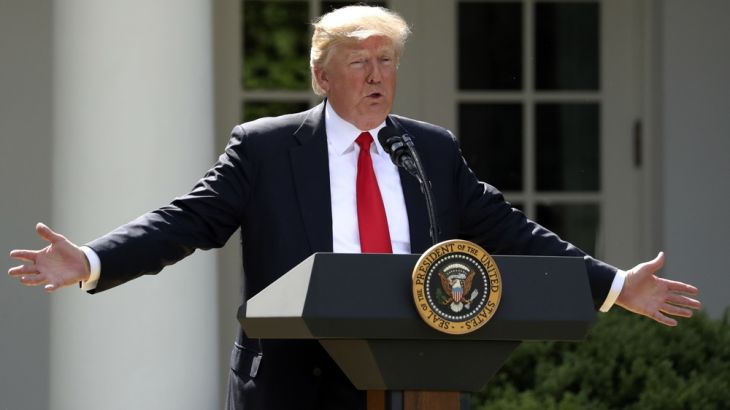
‘Trumponomics’: Making America great again?
We ask whether Donald Trump’s backing of bold economic promises has given the US economy a boost.
It has been six months since US President Donald Trump took office.
Amid a slow and disorderly White House transition – including a string of prominent departures – and an ongoing investigation into his Russia ties, Trump is trying to divert the world’s attention to the US economy.
Keep reading
list of 4 items‘Triple spending’: Zimbabweans bear cost of changing to new ZiG currency
Boeing hit with 32 whistleblower claims, as dead worker’s case reviewed
US imposes new sanctions on Iran after attack on Israel
The Dow Jones Industrial Average just hit the 22,000 mark for the first time in its 121-year history. Stocks headed higher even as Wall Street lost confidence that Trump’s election proposals like tax cuts and infrastructure spending will be pushed through Congress.
What's been encouraging and positive is Mr Trump has failed to do anything to disturb things. His policymaking thus far has been pretty incoherent, pretty chaotic, he's not really managed to do anything which could disturb the underlying stability of the economy, and that's been a good thing.
There are expectations of a loosening of Wall Street rules put in place after the financial crisis, which has given a boost to financial stocks like Goldman Sachs. The second quarter earnings season has been largely better than expected.
The US Department of Commerce estimates the economy grew at a 2.6 percent annual rate in the April-June period.
But Trump’s tax cuts are months behind schedule. The failure of healthcare reform raises questions about his ability to get a budget passed. And there’s also a great deal of uncertainty about his trade policies.
So what’s the state of US economy and what’s Trump got to do with it?
“The stock market and the economy are doing well in the United States in spite of, rather than because of, what Donald Trump has done,” explains Russell Jones, a partner at Llewellyn Consulting.
“The economy is in reasonable shape in broad macroeconomic terms. We’ve got growth which is around potential, we’ve got an inflation rate which is a little bit below target, we’ve got relatively limited budget and external deficits – so it’s in balance. What’s been encouraging and positive is, Mr Trump has failed to do anything to disturb things. His policymaking thus far has been pretty incoherent, pretty chaotic, he’s not really managed to do anything which could disturb the underlying stability of the economy, and that’s been a good thing,” says Jones.
Asked about Trump’s so-called economic nationalism and protectionist stance, Jones says, “What we know from history is that periods of major restraints on trade have been pretty damaging, not just for the country that imposes those restraints but for the global economy more generally. And if the United States is setting the precedent of going down this protectionist route, I think it would be a very bad sign for the world economy in the future.”
Also on this episode of Counting the Cost:
Qatar Gulf Crisis: Qatar’s national carrier, Qatar Airways, is expected get approval for three new international flying routes. That’s after a recent meeting of the International Civil Aviation Organization. The UN agency discussed the airspace ban imposed by four Arab countries on Qatar two months ago, as Daniel Lak reports from Montreal.
Meanwhile, Qatar has filed a wide-ranging legal complaint at the World Trade Organisation as a way to challenge the trade boycott by Saudi Arabia, Bahrain and UAE.
Hosuk Lee-Makiyama, a director at ECIPE, tells us why he thinks the future of the free trade system could be at stake.
Artificial Intelligence: US technology firms are now at the forefront when it comes to our digital economy. And one of the technologies that many of them are investing in is Artificial Intelligence (AI). This basically means getting computer programs to do things like translation and decision-making, things humans would normally do. This week, Facebook had to abandon an experiment after two of its robots began talking to each other in their own language. Rob Reynolds reports.
Greece Lightning: The Greek government say the bad times may be coming to an end, pointing to economic reforms and renewed borrowing as proof that it is behaving responsibly. But the cost to people is growing. Businesses say punitive taxes are making life impossible and punishing those not responsible for the financial crisis in the first place.
Laurence Lee takes a look at the economic troubles from the island of Chios. And Philip Ammerman, a cofounder of Navigator Consulting Group, also gives us his view.
Microchips in employees:: A US firm has begun implanting microchips the size of a grain of rice in its employees. Three Square Market, a technology firm in Wisconsin, said 50 of its employees had voluntarily signed up to have the Radio-Frequency Identification technology fitted. It is implanted between the thumb and forefinger and will allow employees to access offices and computers and pay for snacks among other functions. But, as Diane Eastabrook reports, some are questioning their security.